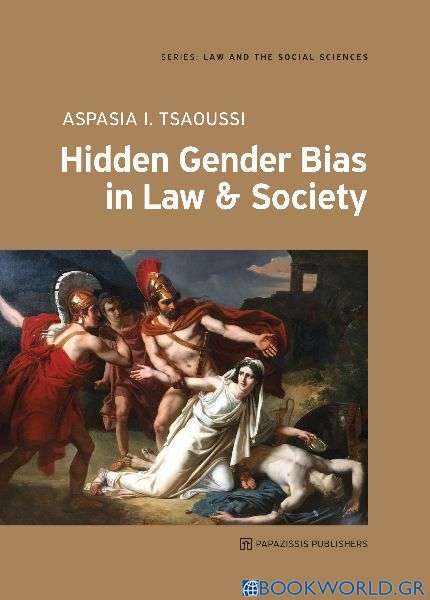Hidden gender bias in law & society
Εκδότης:
Εκδόσεις Παπαζήση
Έτος:
2022
ISBN:
9789600240153
Σελίδες:
230
Εξώφυλλο:
Μαλακό

Τιμή εκδότη:€14,84
Η τιμή μας: €13,36
Hidden gender bias in law & society
For the past decades, legal systems worldwide have prohibited discrimination on the basis of gender, race, ethnicity, religious beliefs, sexual orientation, age or disability. However, post-COVID research shows that domestic violence against women is on the rise, while in less developed countries girls have a low social value, plagued by forced marriages, bride burnings, and gang rapes. Why does gender discrimination persist? We provide answers to this question by focusing on the hidden aspects of gender bias that feed all forms of gender inequality. Implicit gender bias is pervasive and largely unconscious, thus more difficult to measure compared with explicit bias. Research indicates that it usually begins at home through socialization. In 2020, it was reported that the Global Gender Gap would be bridged in 136 years. Progress on gender equality is too slow. We present data demonstrating that implicit biases are a main reason for this delay. Gender-unequal countries are burdened with a high “implicit bias tax” that diminishes societal investment in the education and work-related opportunities of women. In less developed countries, women are likely to remain impoverished in terms of education, access to health care, wealth and income. Legal Science must take a serious interest in empowering women by combatting any and all vestiges of hidden gender bias in legislation and in the social institutions regulated by Law. We propose that governments make generous investments in women’s capital: educational, financial, social and political. The resulting improvements in human development will bring economic parity and better life chances to all social minorities.
For the past decades, legal systems worldwide have prohibited discrimination on the basis of gender, race, ethnicity, religious beliefs, sexual orientation, age or disability. However, post-COVID research shows that domestic violence against women is on the rise, while in less developed countries girls have a low social value, plagued by forced marriages, bride burnings, and gang rapes. Why does gender discrimination persist? We provide answers to this question by focusing on the hidden aspects of gender bias that feed all forms of gender inequality. Implicit gender bias is pervasive and largely unconscious, thus more difficult to measure compared with explicit bias. Research indicates that it usually begins at home through socialization. In 2020, it was reported that the Global Gender Gap would be bridged in 136 years. Progress on gender equality is too slow. We present data demonstrating that implicit biases are a main reason for this delay. Gender-unequal countries are burdened with a high “implicit bias tax” that diminishes societal investment in the education and work-related opportunities of women. In less developed countries, women are likely to remain impoverished in terms of education, access to health care, wealth and income. Legal Science must take a serious interest in empowering women by combatting any and all vestiges of hidden gender bias in legislation and in the social institutions regulated by Law. We propose that governments make generous investments in women’s capital: educational, financial, social and political. The resulting improvements in human development will bring economic parity and better life chances to all social minorities.
| Τίτλος βιβλίου: | Hidden gender bias in law & society | ||
|---|---|---|---|
| Εκδότης: | Εκδόσεις Παπαζήση | ||
| Συντελεστές βιβλίου: | Τσαούση Ασπασία Ι. (Συγγραφέας) | ||
| ISBN: | 9789600240153 | Εξώφυλλο βιβλίου: | Μαλακό |
| Σειρά εκδότη: | Δίκαιο και Κοινωνικές Επιστήμες / LAW AND THE SOCIAL SCIENCES | Σελίδες: | 230 |
| Στοιχεία έκδοσης: | Δεκέμβριος 2022 | Διαστάσεις: | 24x17 |
| Κατηγορίες: | Επιστήμες > Επιστήμες του Ανθρώπου > Δίκαιο | ||
Δεν βρέθηκαν στοιχεία για τον συγγραφέα











